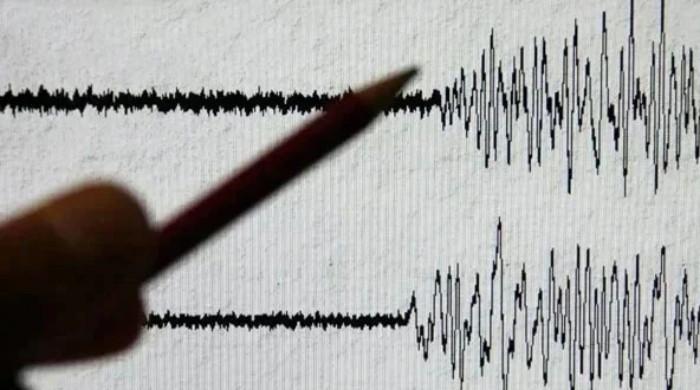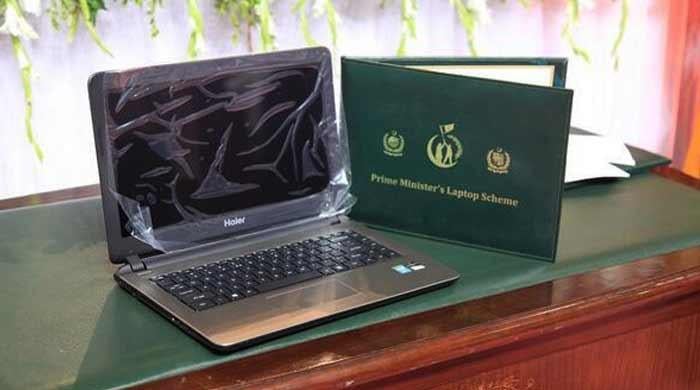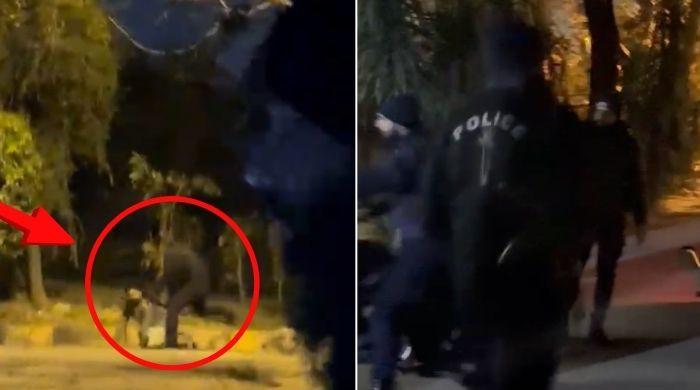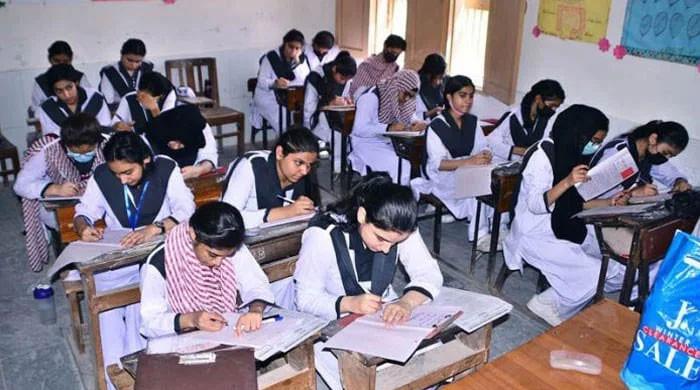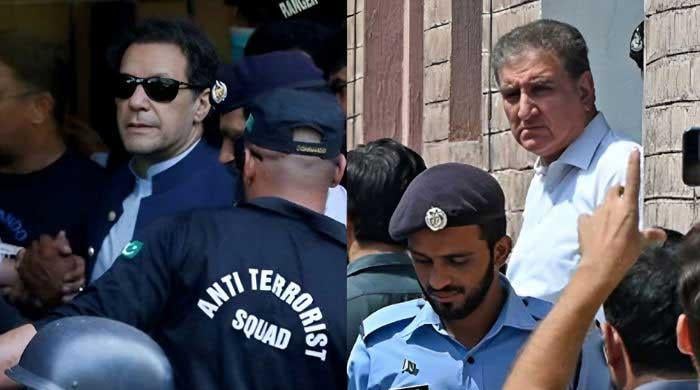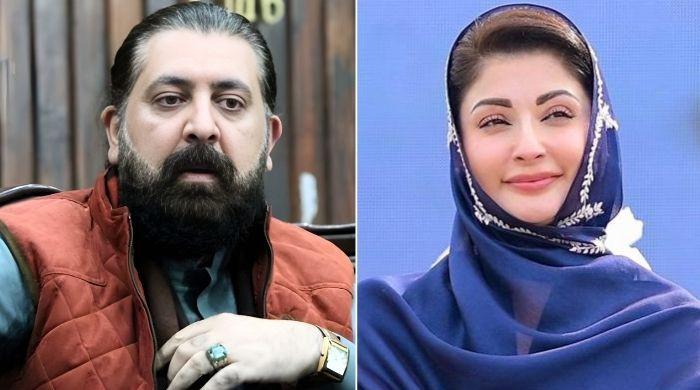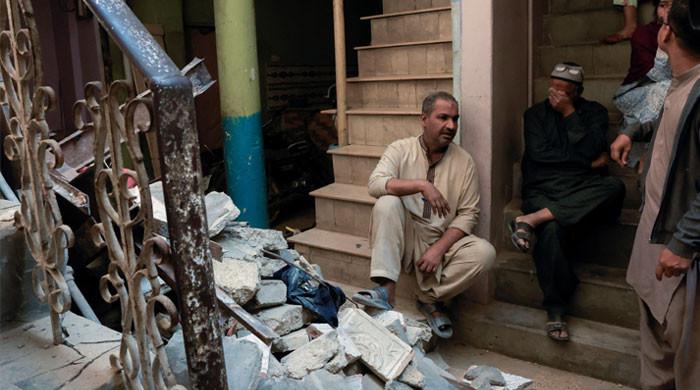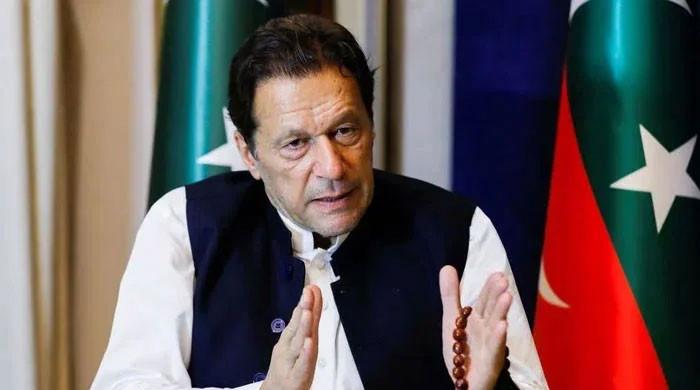After 'unsatisfactory' response, IHC to indict Imran Khan in contempt of court case in two weeks
Islamabad High Court Chief Justice Athar Minallah says IHC to indict Khan on September 22
September 08, 2022
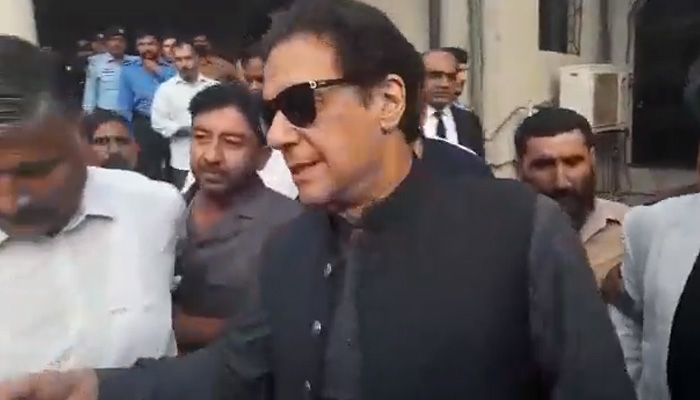
- Islamabad High Court finds Imran Khan's reply "unsatisfactory".
- IHC CJ Athar Minallah says court will indict Khan on September 22.
- Khan submitted two responses, but didn't issue unconditional apology.
ISLAMABAD: Islamabad High Court (IHC) Thursday decided to indict PTI Chairman Imran Khan on September 22 after the former prime minister did not submit an unconditional apology.
"Imran Khan's response was unsatisfactory," said IHC CJ Athar Minallah. CJ Minallah is heading a five-member bench — comprising Justice Mohsin Akhtar Kayani, Justice Miangul Hassan Aurangzeb, Justice Tariq Mehmood Jahangir, and Justice Babar Sattar — that heard the case.
Once the court took a five-minute break after the reservation of the verdict, Khan got up and asked the court if he could speak. At this, the IHC CJ said that the court had heard his lawyers.
"I want to give my stance; the court can question me," Khan said, but the court prefered to let it be and decided against listening to the PTI chairman.
The court had last month taken notice of the former prime minister's speech at a public rally, where he allegedly threatened Islamabad additional sessions judge Zeba Chaudhry for extending PTI leader Shahbaz Gill's remand.
At the last hearing, the IHC chief justice had asked Khan to ensure that he submits a "well-considered" response in seven days to the show-cause notice, otherwise the court would have its way.
In his first response to the IHC's show-cause notice in the case, the PTI chairman did not apologise, offering, however, to withdraw his remarks “if they were inappropriate.”
In his latest response, which was a 19-page-long document, the PTI chairman seemingly opted to tell the court that it should discharge the notice based on his explanation and follow the Islamic principles of forgiveness.
However, in both responses, the PTI chairman did not offer an unconditional apology, which ultimately led to the court taking the decision despite amici curiae suggesting that the former prime minister be forgiven.
Today's hearing
During the hearing, the IHC chastised the PTI chairman, saying that the former prime minister seeks to "constantly justify" his actions, in a case pertaining to contemptuous remarks he made about a magistrate in a rally speech.
"It appears you have no realisation of the gravity of the situation," said IHC Chief Justice Athar Minallah.
Expressing his disappointment in the response given by Khan to the court, which was the second of its kind, the court asked: "Even after the court's input on the matter, this is the response submitted?"
"It seems you want to fight this case [...] and you have no realisation that the case against you is extremely seriously," noted Justice Minallah.
Justice Sattar noted that "threatening" words were used by Khan in his speech, that he showed "no remorse", and that recent statements also seem to suggest he has "no remorse".
The court regretted that Khan, instead, is constantly attempting to "justify" his actions.
The PTI chair appeared before a five-member IHC bench amid strict security measures in place in and around the premises of the court, including the deployment of 788 cops under the supervision of two superintendents of police.
Moreover, the ways leading to the court have been barricaded with barbed wires, while the availability of tear gas shells and an armoured vehicle has also been ensured to deal with any untoward situation.
'We want to wind up this matter'
At the outset of the hearing, Imran Khan's lawyer Hamid Khan started arguments, saying that he agrees with the observation given by the court at the last hearing and wants to put precise requests before the court.
"We want to wind up this matter," he said, informing the court that a detailed reply has been submitted.
The lawyer contended that the IHC referred to two verdicts of the Supreme Court, which were issued in the cases of Daniyal Aziz and Talal Chaudhry.
"Imran Khan's case doesn't fall under these two verdicts. The two cases were totally different from that of Imran Khan," he maintained.
At this, CJ Minallah remarked that there are three types of contempt of court, described in the Firdous Ashiq Awan case which was a matter of scandalising the court.
"There is civil contempt of court, the second is judicial contempt and the third criminal contempt," he said.
'Criminal contempt'
The IHC CJ went on to say that action under criminal contempt of court wasn't taken in Daniyal Aziz and Talal Chaudhry cases.
"This [Imran Khan's case] is criminal contempt which is related to an under-trial case," he added.
CJ Minallah said without mentioning Imran Khan that [PTI] supporters were provoked against a female judge.
He said that the court has clearly informed the defence about the gravity of the matter.
"What if anything happens to the judge?" he asked.
Meanwhile, Justice Sattar remarked how a political leader could say that he would take action against a judge while speaking at a public gathering.
"There is a separate forum for an action against a judge but that's not a public rally," he said.
At this, Hamid Khan, Imran's counsel, maintained that the PTI chair missed the word "legal" while saying he'll take action against the judge.
"Legal action also translates into a complaint," he said.
Responding to the argument, Justice Sattar asked how a leader could say that he would take "legal action" against a judge.
"There is a mechanism for legal action against a judge," he said.
'Red line'
Declaring subordinate judiciary a ‘red line’, IHC CJ Minallah warned the PTI chairman that threatening a district judge is a more serious offence than a Supreme Court justice.
Expressing his displeasure over the reply submitted by Khan, the CJ asked can the former prime minister give an excuse for his ignorance.
“The offence is very serious which has not been realised,” remarked Justice Minallah, saying they only have to look at the law.
At this, Hamid said that they have realised, hence, they mentioned it in their written response.
The judge asked if their reply was appropriate in light of the SC’s verdicts.
No one can pressurise the court, observed the CJ.
Defending his client, Hamid clarified that Khan wrote in his reply that he respects the district and the apex court. He maintained that his client had made the statement due to the alleged torture of Shahbaz Gill.
Speech 'different' from Nehal Hashmi
Then, Khan requested his counsel to seek the court's permission for letting him speak.
"Imran Khan wants to give an explanation of his speech from the day before yesterday," Hamid said, adding that the reference given in the court regarding his speech was based on misreporting.
The IHC CJ said it would be played later in the courtroom. He added that in PML-N leader Nehal Hashmi's case, despite him not naming any judge, he was convicted.
"However, Imran Khan's speech is completely different," Hamid told the bench.
At this, IHC CJ Minallah said that threatening a district judge is a much more serious offence than threatening a top court judge. "Had you issued such statements against us, we would have never taken notice of that."
Khan's counsel said that he had never opined that lower courts deserved lesser respect, rather that he respected all the courts.
Then Justice Sattar asked that if Khan does not like the judgement of this court, then will he start issuing such statements against the bench. "If you don't like order, then will you keep responding in this manner? Does only your lawyer understand what you said and no one else?"
Justice Sattar said that maybe Khan does not understand the gravity of the consequences as he submitted a weak response.
IHC CJ also voiced Justice Sattar, saying that a huge responsibility falls on the leaders of political parties as they have a massive following.
'Propaganda' on social media
Hamid then told the court that the SC accepted Khan's apology with an open heart. He added that today's case and the case of 2014 are no different and the IHC should discharge this case.
Khan's counsel also said that politicians utter words mistakenly.
At this, Justice Tariq Jahangiri said that was Khan made aware of the fact that the medical board had rejected all the claims of torture against Gill. The case was already being heard at the IHC.
Another lawyer from the PTI Shoaib Shaheen said that the jail superintendent and medical officer confirmed that there were marks on Gill's body.
Hamid also told the court that his client raises his voice for other people and women as well, but his statements are taken in a negative context.
The IHC CJ then reiterated that this was an issue of the parties and their leaders that such political isolation is taking place in the country. "Has any political leader stopped their follower [from propaganda]?"
The CJ lamented that baseless propaganda against people and the judiciary is disseminated on social media, adding that it was the fault of political leaders that such a situation had arisen.
Khan 'repeatedly committed contempt of court'
During the proceedings, Attorney General for Pakistan Ashtar Ausaf Ali said that Imran Khan was trailed in a contempt court in 2014.
The same charges were levelled against him and the same procedure was adopted, however, he was pardoned later. Imran Khan did not submit his affidavit in the case, the attorney general said, adding that his reply has no value.
Referring to his speeches in public rallies, Ausaf said that he named the female judge even in his party’s second public meeting.
Imran Khan had submitted an affidavit in the SC, assuring the court that he will not make derogatory remarks against the judiciary in the future.
“One again, the person standing in the court under the same charges,” the AGP said and asked if he think that he would be pardoned again and again.
The suspect involved in the contempt of court case did not express regret for his derogatory remarks, he added.
Amicus curiae asks to forgive Khan
While assisting the court, amicus curiae Makhdoom Ali Khan said that laws related to contempt of court are not meant to protect judges. "This law is concerned with the obstruction of justice," he said.
When the CJ Minallah referenced the suspension of former US president Donald Trump's Twitter account, Makhdoom Ali said that Trump's case was not related to contempt of court. "The account was probably suspended because Trump may have insulted Congress."
He added that the US president had termed the court's ruling the "worst decision". Over there, the judiciary showed reluctance and took another way.
In response, the CJ said that Trump's account was suspended in the United States because he was inciting the public through his tweets.
Makhdoom replied: "You had said it yourself that there should be no restriction on freedom of expression." He also suggested a case related to the contempt of court against Imran Khan should be dismissed.
Upon hearing this, Justice Babar Sattar said: "Since you are saying that a political leader should be judged in the context of the prevalent political situation, then what will become of the principle that everyone is equal?"
Makhdoom responded by saying that the court took such steps to prevent the obstruction of justice.
CJ Minallah then asked Makhdoom whether the answers provided by Khan were satisfactory.
"Other leaders of the same party also spoke against this court, but we don't care about these things. Therefore, we dismissed the pleas of contempt of court against them," the CJ said.
Makhdoom said that when the former premier issued a threat to a judge, a five-member bench was formed. "This itself is a very important matter regarding the subordinate courts".
The chief justice said that had something been said about him, he would not have taken notice of that. "But right now, the court is concerned with the delivery of justice".
Makhdoom maintained that the cases in this court were closer to politics, so, whenever party a decision was announced against a party, the court was subjected to criticism.
"The court has to make sure that no leader is cornered," Makhdoom Ali said.
Upon hearing this remark, Justice Sattar asked whether the court will have to see the stature of the leader concerned and the impact the decision will have on the political milieu of the country.
"Are you saying that the courts act like puppets in making such decisions?" he questioned.
"I can never use words like puppet [for a court]" Makhdoom responded.
The CJ then told Makhdoom that after the contempt of court proceedings, the conduct that should have been demonstrated was not seen.
"Don't be afraid of social media. Just tell me what you recommend?" the CJ asked Makhdoom. "The political leadership is responsible for what is happening on social media. Therefore, the leaders must train their followers."
CJ Minallah added that since social media has no credibility, it should not be feared at all.
Makhdoom Ali said: "This was perhaps the first case of its kind related to the subordinate judiciary as a five-member larger bench was formed just to review the statement of a political leader.
"Do you want us to accept the justification presented [by Khan]", the CJ asked Makhdoom. "They [the PTI] have not realised the seriousness of the matter yet."
"Imran Khan expressed remorse and pleaded for the show-cause notice served to him to be discharged, Makhdoom Ali said. "If the court decides, this case will not be taken further."
Upon this, the IHC CJ said: "We have nothing to say. The Supreme Court's decisions are binding on us."
'I will be more dangerous if sent to jail'
Before appearing for the hearing, the PTI chairman told journalists that he would become "more dangerous" if the government decides to send him behind bars.
"They have been trying to [put me in jail for long now]. I will be more dangerous if they send me to jail," Khan said, as he smiled, showing confidence ahead of the hearing.
The PTI chairman wondered who did the authorities fear as they had deployed a heavy contingent of police outside the IHC.
He also refused to comment on whether he would apologise to the court or not.
Plea seeking dismissal
Just hours before the hearing, Khan filed a new miscellaneous plea seeking permission to submit written arguments.
In his fresh plea, Khan argued that the high court cannot exercise suo moto jurisdiction as per the Constitution. The arguments on the inadmissibility of the contempt case should be kept on record.
“The written arguments will also be explained in the oral arguments during the course of the proceedings,” read the plea.




